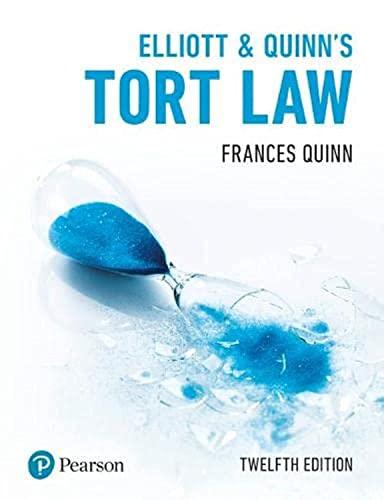Question
Criminal and civil cases are initiated differently, and the titles of the individuals involved differ slightly. Criminal cases are only initiated by the federal or
Criminal and civil cases are initiated differently, and the titles of the individuals involved differ slightly. Criminal cases are only initiated by the federal or state government, in response to a law being broken. The federal or state governments are known as the prosecution. The prosecution is an attorney, or group of attorneys, hired by the government to present a case against the accused. Criminal cases are usually titled something like "State v. [last name of the defendant accused of a crime]." In criminal prosecutions, the victim is not a party to the lawsuit, but might be a witness for the state, at the trial.
In contrast, private parties initiate civil cases when they feel that they have injured someone. Again, civil cases stem from breach of contract, custody cases, and attacks on one's character. Private parties can include an individual, a group, or a business. The person, group, or business who initiates the case is referred to as the plaintiff or complainant. The accused is referred to as the defendant, in both criminal and civil proceedings.
Typically, there is a difference in the burden of proof for the two types of cases. In a criminal case, the defendant must be proven guilty "beyond a reasonable doubt." In a civil case, the defendant must be proven liable through a "preponderance of the evidence." In other words, the prosecution in a civil case must prove that it is more probable than not that the defendant is liable.
In criminal cases, the defendant is entitled to an attorney and may be appointed an attorney, if he or she is not able to afford one. The state appoints the attorney. In contrast, all parties involved in the civil case are required to secure their own legal representation.
Typically, civil and criminal laws use different terminology, and being found guilty or accountable in each type of case results in different consequences.
By contrast, in a civil action (lawsuit), the plaintiff is the person who is alleging that he or she has actually been harmed (physically, financially, or in another manner), and the defendant is the one who is asked to pay damages or otherwise compensate the plaintiff. Outside of financial compensation, the plaintiff may be ordered to do something or refrain from doing something, which is referred to as injunctive relief.
In the Liebeck v. McDonald's case, a woman sued McDonald's for serving hot coffee. The woman spilled hot coffee on her lap while trying to add cream and sugar. The woman sued McDonald's for negligence, in a civil suit. The issue centered on whether or not the coffee's specific temperature was unreasonably hot. McDonald's lost the lawsuit. The compensatory verdict was $160,000. McDonald's was found liable.
Conversely, if a defendant is convicted of committing a crime, the consequences are usually incarceration (jail/prison) and/or a fine (payment of money to the state).
The word used to describe the legal responsibility for harm in a civil case is liability, not guilt. Guilty is the word used to describe a person found guilty of committing a crime in a criminal case.
Businesses can be charged with criminal acts as well. In 2017, Oliver Schmidt, former manager of a VW engineering office near Detroit, was arrested. He faced years in prison for attempts to defraud the United States, wire fraud, violation of the Clean Air Act, and a charge of giving an untrue statement under the Clean Air Act. Schmidt's actions directly violated a business law and, since his actions violated an established law, he was held criminally liable. In December of 2017, Schmidt was sentenced to seven years in prison.
Criminal and civil court cases are different. Consider the two business cases described in this section of the Reading. One was a criminal case and one was a civil case. Do you believe that businesses should be charged both civilly and criminally? Or should they be charged in one way, but not the other? Explain your answer.
Step by Step Solution
There are 3 Steps involved in it
Step: 1

Get Instant Access to Expert-Tailored Solutions
See step-by-step solutions with expert insights and AI powered tools for academic success
Step: 2

Step: 3

Ace Your Homework with AI
Get the answers you need in no time with our AI-driven, step-by-step assistance
Get Started


